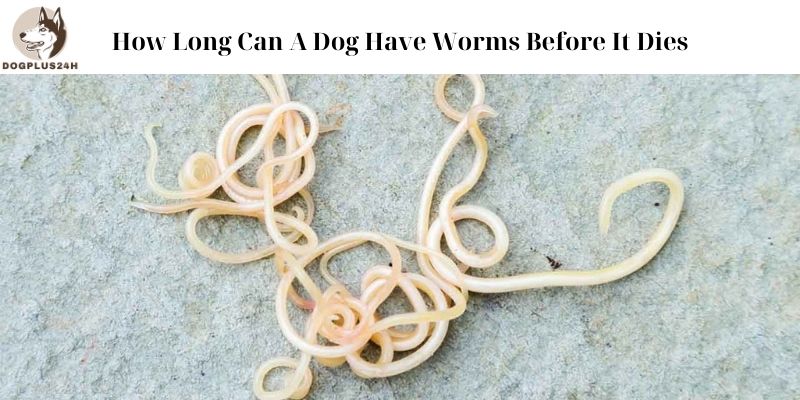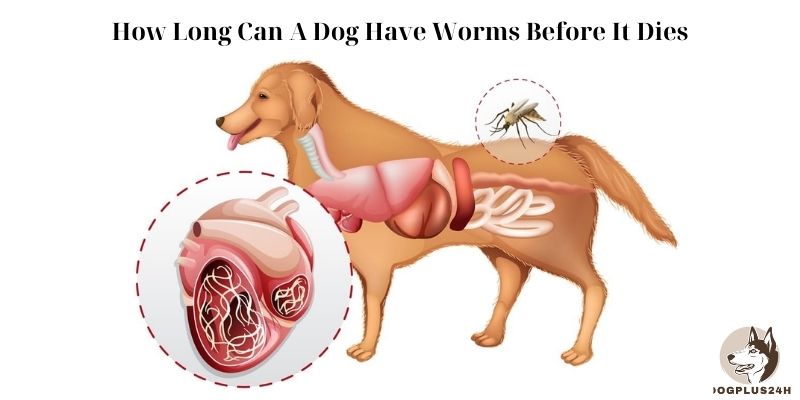How Long Can A Dog Have Worms Before It Dies? Although it is rare, it does occasionally happen for dogs to pass away from worm infestations. Depending on the type of worm and the severity of the infestation, a dog with a serious worm infestation can live anywhere from a few days to several weeks. The dog must have worming treatment in order to survive and live a longer, healthier life. Dogplus24h.com will give you the best answer to your wonder “How Long Can A Dog Have Worms Before It Dies”, we also give you the ways to treat worms in dogs:
How Long Can A Dog Have Worms Before It Dies?
Several variables can affect How Long Can A Dog Have Worms Before It Dies. The kind of worms, the degree of the infestation, the age, general health, immune system power, and the existence of other underlying medical diseases are a few of these variables.
A dog with a minor worm infection may not exhibit immediately lethal symptoms and may even go for a long time without any obvious problems. Even minor infestations, meanwhile, can lead to discomfort, weakened immune systems, and other health problems that can lower a dog’s quality of life.
However, if left untreated, severe worm infestations can cause serious health issues and, in some cases, even pose a threat to life. The negative effects of worm infestations are particularly dangerous for puppies and dogs with compromised immune systems.

To properly detect and treat worm infestations, prompt veterinarian care is essential. A veterinarian can identify the kind of worms the dog is infected with and prescribe the right drugs to get rid of them. They can also offer advice on precautions to take and a program for deworming the dog to safeguard its health.
It’s crucial to keep up with good cleanliness habits, schedule routine vet visits, and give your dog the preventative drugs that the doctor prescribes if you want to make sure they’re healthy. Consult a qualified veterinarian right away if you think your dog may have worms or another health condition. That’s the answer to your question How Long Can A Dog Have Worms Before It Dies? We move to 6 types of worms below:
6 Types of Worms that Dogs Can Develop

- Roundworms: The most typical worm parasite detected in dogs is the roundworm. They are normally white or off-white in color and live in the intestines.
- Tapeworms: Typically brought on by consuming fleas that are contaminated with worm eggs, these worms cling to the lining of a dog’s intestines.
- Hookworms: By feeding on a dog’s blood, these worms, which reside in their intestines, can induce severe anemia.
- Whipworms: Due to their size and location in the lower portion of a dog’s large intestine, whipworms are among the most challenging worms to diagnose.
- Heartworms: One of the most dangerous infestations, spread via mosquito stings.
- Lungworms: Dogs’ lungs are home to these worms. Through contact with canine feces, they can be transferred to people.
How to treat worms in dogs and what you need to know:
1. Symptoms of Worms in dogs:
Worm infestations in dogs can manifest with various symptoms, depending on the type of worms and the severity of the infestation. Some common symptoms of worms in dogs include:
- Visible Worms: In some cases, you may notice worms in your dog’s feces or around their anus. Different types of worms, such as roundworms and tapeworms, may appear as small, white or brown, rice-like segments.
- Diarrhea: Worm infestations can irritate the dog’s gastrointestinal tract, leading to diarrhea. The stool may be loose, contain mucus, or have blood streaks in severe cases.
- Vomiting: Dogs with worms may vomit, especially if the infestation is severe.
- Weight Loss: Worms can deprive the dog of essential nutrients, leading to weight loss and a general decline in body condition.
- Pot-bellied Appearance: Puppies with roundworm infestations may develop a bloated or pot-bellied appearance due to the accumulation of worms in their intestines.
- Dull Coat and Poor Coat Condition: Dogs with worms may have a dry, rough, or lackluster coat.
- Lethargy: Infected dogs may appear tired, lethargic, and have a reduced appetite.
- Anemia: In severe cases of hookworm or whipworm infestations, dogs can develop anemia due to blood loss from the worms’ feeding activities.
- Scooting: Dogs infected with tapeworms may scoot or drag their rear end on the ground due to irritation around the anus.
- Coughing: In some cases, heartworm infestations can cause dogs to cough as the worms affect the respiratory system and heart.
It’s important to note that some dogs may not show obvious symptoms, especially in the early stages of infestation. Regular check-ups with a veterinarian and fecal examinations can help detect worms even if your dog appears healthy.
2. How to Treat Worms in Dogs?

Dogs with worms are often treated with deworming drugs that a doctor has prescribed. Depending on the type of worms infecting your dog, the specific treatment strategy may change. A veterinarian must be consulted in order to receive an accurate diagnosis and develop an effective treatment strategy. The general steps for treating canine worms are as follows:
- Visit the Veterinarian: Make an appointment to see the vet if you think your dog may have worms or if you detect any signs. The veterinarian will examine the animal physically and could ask for a fecal examination to determine what kind of worms are present.
- Prescription Drugs: The veterinarian will prescribe the proper deworming drugs once the type of worms has been determined. It’s important to heed the advice of the veterinarian because different treatments work against particular kinds of worms.
- Follow the veterinarian’s directions on how to give your dog the deworming medications to ensure success. Dewormers are frequently taken orally as liquid preparations, chewable pills, or tablet tablets.
- Repeated Treatments: Repeated deworming treatments may be required in some circumstances, particularly for puppies or animals with severe infestations. Observe the veterinarian’s advised schedule for additional treatments.
It’s crucial to closely follow the veterinarian’s instructions and avoid giving over-the-counter dewormers without advice from a healthcare provider. Some over-the-counter medications might not work against certain worm types or might hurt your dog if they’re misused.
3. Factors That Affect The Duration Of A Worm Infestation In Dogs
- Age: Age-related factors may shorten the length of a worm infection in dogs since a younger dog’s body may be better able to fight off the worm. A senior dog’s reduced immune system may cause a lengthier infestation.
- Food: A dog’s food may affect how long a worm infestation lasts. For instance, a dog with a diet deficient in nutrition may lack the nutrients required to sustain the body’s immune system, which could cause the infestation to last longer.
- Intensity: A severe worm infestation would likely require more treatment and last longer than one that is mild.
- Other Health Problems: A dog may be more susceptible to contracting worms and take longer to get rid of them if it already has a condition that impairs its immune system or digestive system
- Type of worm: Some worm types may be more difficult to treat than others. Some varieties of intestinal worms may respond better than others to deworming drug treatment.


